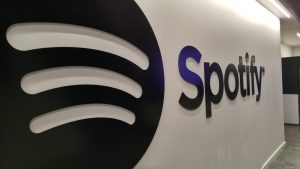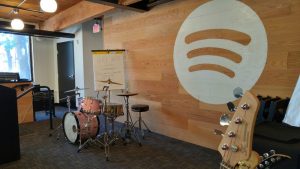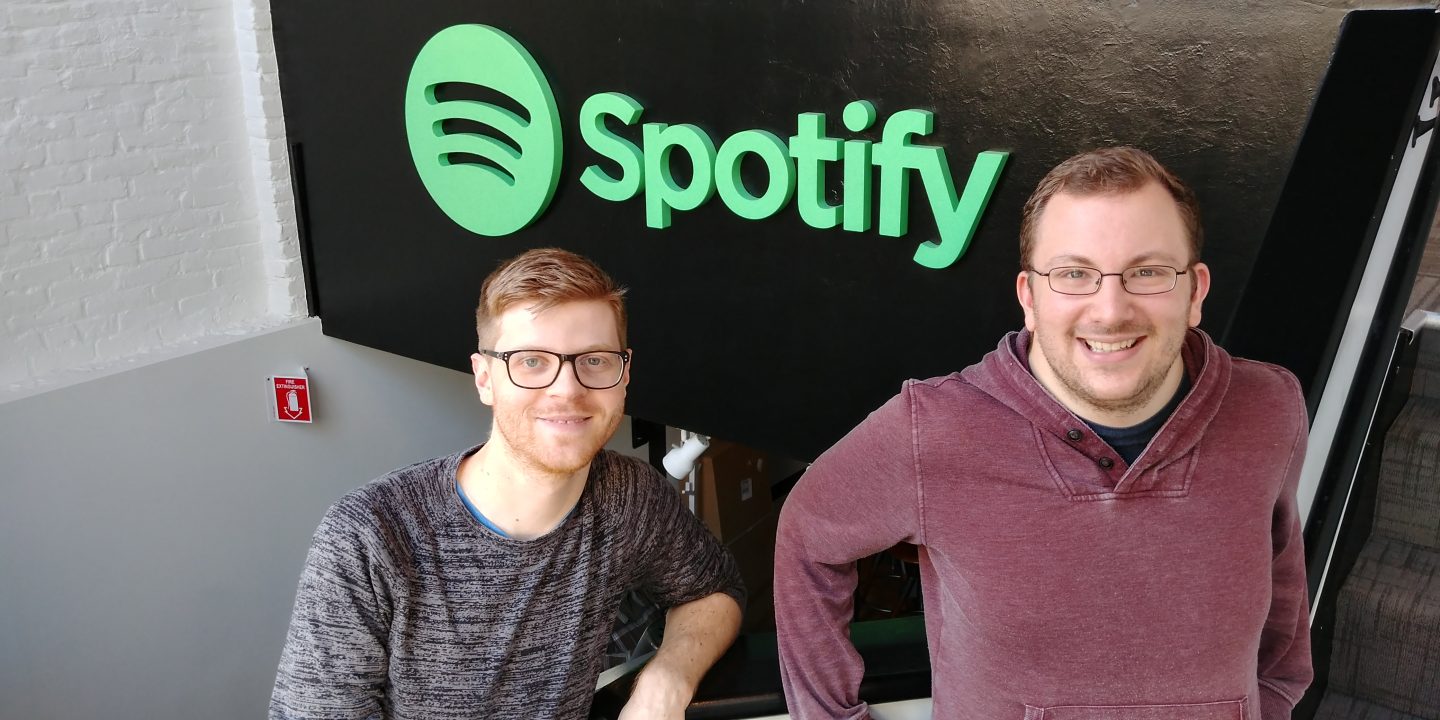CAMD Alumni Matt (left) and Ben (right) at Spotify.
Two CAMD alumni, Matt Cronin and Ben Cooper, are currently working at Spotify as Data Curators. They both graduated from the Music program in 2012, and started their careers right away. After graduation, Matt worked as a Sales Assistant at Cabot and Company, a residential real-estate company, while playing in a band on the side. Ben, on the other hand, returned to one of the companies he had been a co-op for, The Echo Nest, which was later acquired by Spotify. Both Matt and Ben, peers when they were students at Northeastern and now co-workers, are finding lots of ways to apply their education and love of the music industry to their current roles. We recently caught up with them to learn more, below.
Tell us about your current roles at Spotify!
MATT: My team is called Data Curation, and our main goals are to improve our recommendation systems that power features like Release Radar and Daily Mix, and to provide quality evaluation on many experiments that our users eventually see. No two days are the same, as we are required to provide music expertise for our company’s algorithmic work, and this requires a different perspective every day, depending on the needs of our colleagues.
BEN: Being a Data Curator is a combination of Quality Assurance and Musical Knowledge and Expertise. We help look at proposed changes to any of Spotify’s recommendation systems to see what the end-result would look like for all kinds of listeners. Outside of the reviews, there really is no “typical” day at Spotify as a Data Curator, as each day can lead to a new project or review. Each member on our team works with engineers to figure out and plan upcoming projects, which can lead to our team having say in what ends up in the final product.

Spotify Boston office.
What drew you to these positions?
MATT: After graduating CAMD with a Music Technology major, I decided to challenge myself and move away from the field of music for a few years to balance out my personal development. I always kept up with my musical side, as the band I joined during my Sophomore year continued making music, but after a few years working in residential real estate in the Back Bay and South End of Boston, I decided it had been too long since my “9 to 5” included at least some Beethoven or The Beatles. My peer in the Music Tech program, Ben Cooper, was a co-op with a company that Spotify acquired called The Echo Nest, and that gave me an introduction to the types of work that are required for success in this current role.
BEN: I kind of have a unique history with this position. I actually started off as a QA co-op back in 2011 at The Echo Nest and loved it. The company culture, the work, I had never seen so many people who cared this much about music and any of their end-users (listeners, companies, artists, etc). I remember seeing the listing for The Echo Nest in the co-op job board and being intrigued by the phrase “music intelligence” and the idea of looking at music recommendations. At the time, one of my roommates was serving as their co-op and recommended that I take a look and apply. After I graduated in 2012, I was asked to come back and work part-time and quickly accepted. In 2014, The Echo Nest was acquired by Spotify, which then made me a Spotify employee. From the acquisition to becoming a full-time team in 2015, to seeing the Data Curation team grow from 4 to 8 incredible people, it’s all amazing. But seeing how our work is directly, and positively, affecting our users might be the most fun and fulfilling part of the job.

How did your classes at Northeastern prepare you for your current jobs?
MATT: My studies at Northeastern gave me a balanced understanding of both the technology behind music and the industry that keeps it going. I was very fortunate to be at Northeastern at a pivotal time for the industry, where the digital revolution hit its inevitable adoption point, and access to music became a monetized commodity. Our class was lucky enough to have professors who shaped our understanding of both the past and the future of the music industry, and without their commitment to setting students up with a clearer path to success in the music industry, it’s tough to know where we’d all be today!
BEN: As a Music Technology major (and Music Industry minor), we were essentially primed to spot patterns (music theory, for instance) and pay extreme attention to detail (pretty much any compositional course). A lot of the compositional and music theory courses played a very important role in my knowledge of classical music. Learning the basics of the Music and the Music Industry in general was a massive help as well. Between Copyright Law and Music Supervision to ethnomusicology, the history of music in various points of history and the world and just having a barebones idea of how the industry works was incredibly important for me to stand out from the crowd.
How did your co-op experiences help you prepare for and/or land your current position at Spotify?
MATT: I was a co-op with one of the predominant independent record labels in the world, Rounder Records. Rounder is known for its work in roots music, with bluegrass and folk at the forefront. While working at Rounder, I was able to see all of the work that goes into A&R and customer relations management, especially during a particularly prosperous time for the label, as its most prominent act, Alison Krauss, won Album of the Year for her collaboration with Robert Plant and T. Bone Burnett on 2007’s Raising Sand. Working here showed me that the music industry was an accessible path for employment, and that a lot of the individuals I would end up working with have similar backgrounds and experience. For me, the biggest barrier was also the lack of knowledge surrounding the entry to the music industry. At Northeastern, we were given the groundwork to be able to market ourselves in a field that is typically daunting.
BEN: My first co-op was at a very small artist management company, Highsteppin’ Productions, in Davis Square, where I worked as a Marketing Co-Op. It was there where I learned how to effectively communicate with internal as well as external parties (schools, universities, venues, etc.). Additionally, because we primarily worked with a New Orleans artist, co-op’ing at Highsteppin’ broadened my musical knowledge of New Orleans music, which added an extra area of musical expertise when reviewing music recommendations.
Any specific co-op highlights?
MATT: I sat directly in front of a framed O Brother, Where Art Thou? platinum record during my co-op. Although the album wasn’t a Rounder release, a lot of Rounder influence, including several artists who were signed to the label. I had never been so close to such a remarkable achievement in recording history. The album sold about 8 million copies since it came out in 2000, won Album of the Year, and has always been one of my family’s favorite albums. Co-op opened a door for me that almost humanized an industry before I truly entered. Part of experiential learning that’s vital for growth is the shedding of impostor syndrome. I feel that the hardest transition from university to the real world falls somewhere on that spectrum. Appearing as though you have the proper pre-requisites to succeed in your concentration is a tall order when you leave college, but through Northeastern’s well-structured co-op resources, this transition was very seamless for me.
BEN: The best part about my co-ops was that I (and the rest of my fellow co-ops/interns) were allowed a voice in terms of how products were either created or assessed. At The Echo Nest, we were seen as a very important group of employees that helped verify and fix any incorrect cultural data that might be shipped to our customers and end users. Additionally, the friends and acquaintances that I’ve met over time due to my experience at The Echo Nest (and now Spotify) is something that I will forever remain thankful for.


